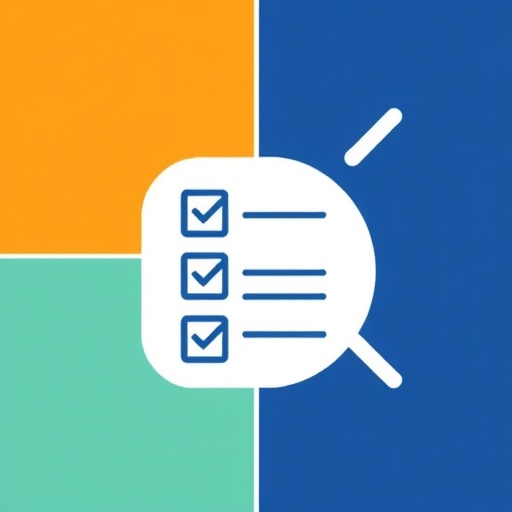Evaluating the quality of research is a foundational pillar in the advancement of scientific knowledge, yet existing appraisal methodologies often fall short when applied to the social sciences. Traditional quality assessment tools predominantly cater to quantitative studies within biomedical fields, leaving a significant void in instruments that can robustly evaluate qualitative and mixed-methods research prevalent in social scientific inquiries. Recognizing these critical gaps, a pioneering study has introduced a novel Quality Appraisal Checklist designed specifically to address the diverse methodological frameworks inherent in social science research.
The development of this new tool, termed the Quality Appraisal Checklist for Quantitative, Qualitative, and Mixed-Methods Studies (QQM Checklist), responds to a pressing need. Existing appraisal instruments exhibit notable limitations—they typically focus on single-method studies and are disproportionately aligned with medical research domains. Such constraints impede comprehensive evaluation across multidisciplinary research landscapes, risking the integrity and accuracy of systematic reviews and meta-analyses in social sciences. Consequently, these limitations propagate biased assessments and undermine evidence synthesis, leading to potential misrepresentations that can skew policy and scholarly discourse.
In a study published in the ECNU Review of Education, researchers led by Professors Xin Tang and Jennifer Symonds embarked on a systematic review and synthesis of current quality appraisal mechanisms. Grounded in a utility-usability framework, this research culminated in the assembly of the QQM Checklist. The checklist strategically integrates universal criteria applicable to all research methods alongside tailored indicators specific to quantitative and qualitative methodologies. This dual structure effectively bridges methodological divides, ensuring that the evaluation process reflects the nuanced exigencies of diverse research designs.
The QQM Checklist’s architecture features eight core indicators that transcend methodological boundaries, capturing essential aspects of study rigor such as clarity of research questions, appropriateness of design, ethical considerations, and transparency in reporting. Complementing this are four to six method-specific indicators meticulously crafted to reflect the distinct demands of quantitative versus qualitative and mixed approaches. For instance, quantitative indicators scrutinize statistical robustness and sample representativeness, whereas qualitative criteria emphasize depth of thematic analysis and contextual validity.
This innovative tool adopts a three-tiered scoring system, which classifies studies into categories of poor, moderate, or high quality based on predefined cut-off points. Such stratification offers evaluators a practical, standardized metric, enhancing the reproducibility and comparability of quality judgments across studies. By explicitly defining thresholds, the QQM Checklist mitigates subjectivity and promotes consistency, a feature often absent in existing appraisal checklists.
Validation of the QQM Checklist employed the Delphi method, a rigorous consensus-building technique that engaged a panel of international experts in iterative rounds of evaluation. This process not only refined the checklist’s items for clarity and relevance but also anchored its utility within real-world research settings. Subsequently, the checklist has been tested in diverse international contexts, demonstrating its adaptability and robustness across cultural and disciplinary boundaries.
Detailed guidance accompanies each checklist indicator, including comprehensive explanations and illustrative examples that facilitate an informed and transparent scoring process. This instructional component addresses a common shortfall in many appraisal tools, where ambiguous criteria obscure evaluators’ decision-making. By illuminating how each indicator can be interpreted and scored, the QQM Checklist empowers users, from early-career researchers to seasoned editors, to apply it confidently and effectively.
One of the transformative potentials of the QQM Checklist lies in its capacity to establish a common quality standard across the research ecosystem. Editors, reviewers, funders, and researchers can converge on a shared framework that transcends methodological and disciplinary silos. This alignment fosters a culture of rigorous appraisal and promotes evidence-based decisions, ultimately enhancing the credibility and impact of published research.
Moreover, the QQM Checklist directly addresses the replication crisis that has affected multiple scientific domains, including social sciences. By enforcing stringent quality benchmarks, it aids in the identification and exclusion of studies with methodological weaknesses, thereby elevating the overall reliability of synthesized evidence. This process, in turn, supports the formulation of sound policy recommendations and advances academic integrity.
Open accessibility is a cornerstone of this initiative. Both the QQM Checklist and the accompanying scholarly paper are available free of charge, encouraging widespread adoption and ongoing refinement through community engagement. The authors’ commitment to transparency underscores the collaborative spirit necessary for advancing research quality globally.
In conclusion, the introduction of the Quality Appraisal Checklist for Quantitative, Qualitative, and Mixed-Methods Studies stands as a landmark development in research methodology. By harmonizing evaluation criteria across diverse study designs and providing a user-friendly yet rigorous framework, it addresses longstanding challenges in social science research appraisal. This advancement has profound implications for the fidelity of systematic reviews and meta-analyses, pushing the frontiers of knowledge production toward greater reliability and inclusiveness. As academic and funding bodies increasingly prioritize methodological rigor, the QQM Checklist is poised to become an indispensable tool, driving forward a new era of transparent and trustworthy scientific inquiry.
Subject of Research: People
Article Title: Quality Appraisal Tools for Quantitative, Qualitative, and Mixed-Methods Studies: A Review and a Brief New Checklist
News Publication Date: 1-Sep-2025
Web References: http://dx.doi.org/10.1177/20965311251371227
References: DOI: 10.1177/20965311251371227
Keywords: Research methods, Research and development, Research programs, Education research, Academic ethics, Academic publishing, Education, Educational methods, Educational levels, Scientific approaches, Science communication, Academic journals, Scientific journals




